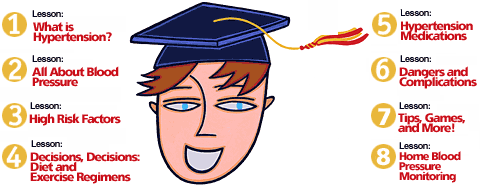



 |
|
|

|
|
Hypertension Lesson 3 - High Risk Factors 
Back to Hypertension Channel
Okay, so here's the problem: EVERYONE is at risk for essential hypertension. Often referred to as "the silent killer," high blood pressure is a condition that effects as many as 50 million — or one in four — adult Americans. Why, you ask? Well, that's another problem — the cause of over 90% of hypertension cases is unknown. However, let's concentrate on what we do know: As we've discussed throughout the course, both genetics and lifestyle choices play roles in the likelihood of developing this condition. Furthermore, certain demographic groups are more susceptible. With this limited information in hand, all we can do is try to live the most heart-healthy life we can in the attempt to keep the condition at bay and/or under control. In the meantime, here are the straight facts: High normal blood pressure
Men vs. women
Age 65 and up
Page 1 2 3 4 5 Copyright © 2000-2026 savvyHEALTH.com. All rights reserved.
|
|
|
|||||||||||||||||
|
About savvyHEALTH | Privacy | Feedback | Home
http://www.savvyHEALTH.com/
All contents copyright © 1999-2026 savvyHEALTH, Inc. All rights reserved.
This internet site provides information of a general nature and is
designed for educational purposes only. If you have any concerns about
your own health, you should always consult
with a physician or other healthcare professional. Please review the Terms of Use before using this site. Your use of the site indicates your agreement to be bound by the Terms of Use.
|
|